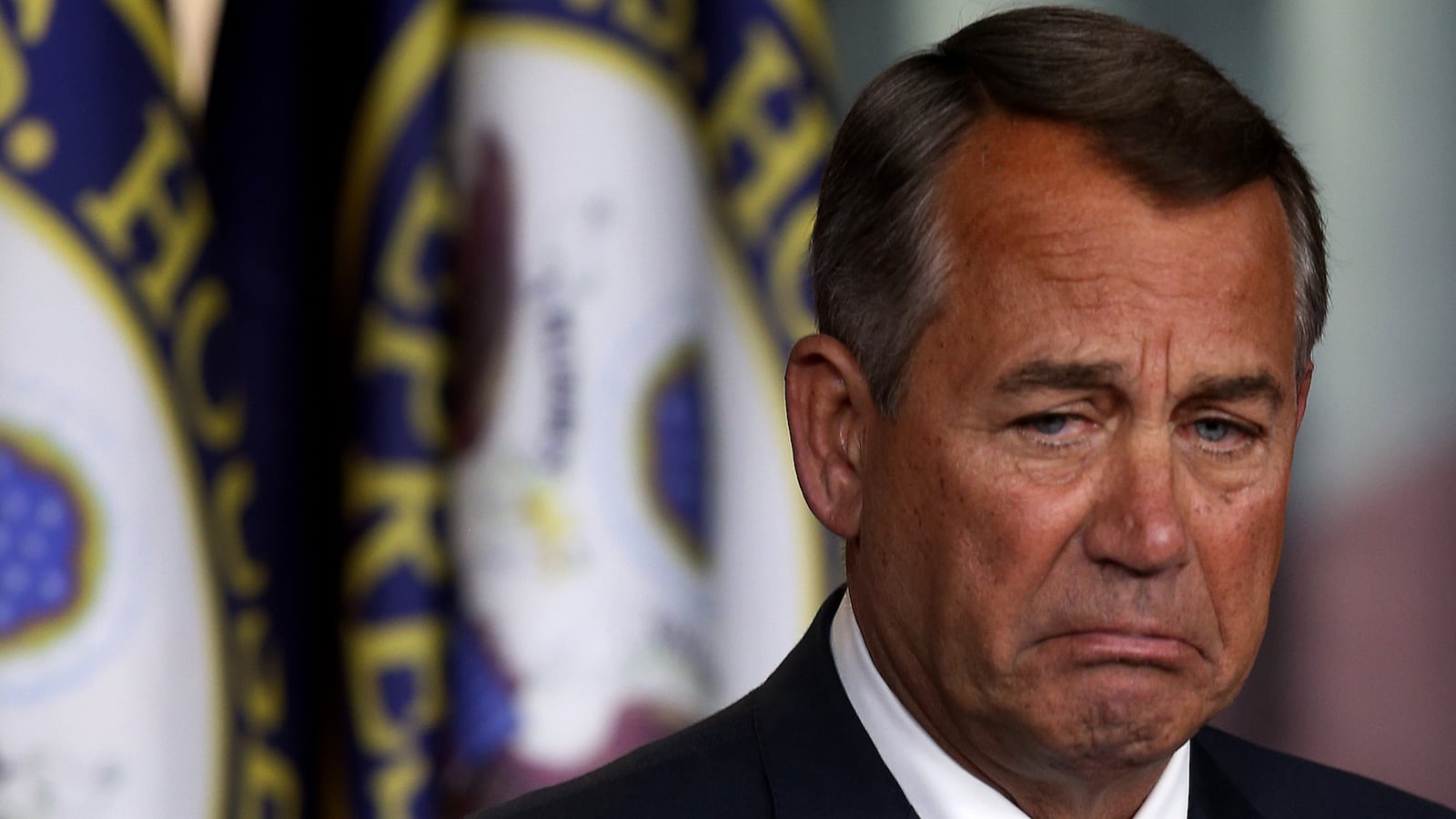House Speaker John Boehner and Budget Committee chairman Paul Ryan defied an ascendant quartet of powerful conservative interest groups Wednesday, privately urging members to stand up to the groups and publicly defending a bipartisan budget agreement with Democrats as a step in the right direction. The speaker also took the opportunity to call the groups out as little more than self-interested hacks.
When a reporter asked Boehner for his reaction to conservative groups’ opposition to the Ryan-Murray budget, he interrupted the reporter mid-sentence in a rare flash of anger.
“You mean the groups that came out and opposed it before they ever saw it?” Boehner asked. “They are using our members and they’re using the American people for their own goals. This is ridiculous.”
And with that, Boehner finally said publicly what many Republicans have been rumbling about privately over the last year, as Heritage Action, the Club for Growth, FreedomWorks, and the Senate Conservatives Fund have become more active in lobbying on more issues, all while warning that they’ll punish House and Senate Republicans who buck the new system.
Boehner’s burst of honesty came as the levers of power have been drained away from the speaker and his position itself. Without crucial legislation passing through committees and earmarks to fund home-state projects, he has little left at his disposal but the power of his argument that Republicans are getting the least bad deal he can wrangle out of the Democrats who run the Senate and White House.
As Boehner’s influence has waned, deal sweeteners for members of Congress have migrated outside the Capitol to conservative interest groups that can promise unlimited campaign donations, a Ted Cruz-size donor list, and the kind of mini-celebrity status in the form of Facebook likes and retweets that a 21st-century conservative needs to win reelection.
But despite the outside groups’ growing power base, Ryan flatly dismissed their objections to his budget deal Wednesday, calling the groups’ aggressive push on Republican members a “strange new normal.”
“I don’t let that stuff bother me anymore. Groups are going to do what they want to do,” Ryan told reporters in the Capitol. “What matters to me is, ‘Am I doing what I think is right? Am I sticking to my principles? And am I listening to my colleagues who actually have a voting card?’”
The agreement Ryan struck with Sen. Patty Murray (D-WI) narrowly increases federal spending for the next two years by rolling back about $60 billion of sequester cuts, divided equally between defense and non-defense spending. It raises some fees to make up for the lost revenue but largely leaves federal spending intact, including Medicare and Social Security, leaving conservative groups livid at what they see as a lost opportunity to shrink the size of government.
Conservatives’ other beef with the Murray-Ryan deal is that it cements a promise not to consider shutting down the federal government again until well after the 2014 midterm elections. GOP leaders see the agreement as a suicide-prevention measure for the Republican Party, but some conservatives consider a shutdown threat a rare point of leverage.
Asked about Boehner, Club for Growth president Chris Chocola, said, “We stand with Marco Rubio, Ted Cruz, Tom Coburn, Rand Paul, members of the Republican Study Committee, and every other fiscal conservative who opposes the Ryan-Murray deal.”
Matt Kibbe, executive director of FreedomWorks, called Boehner’s comments about the outside groups “smears.”
“Speaker Boehner’s real problem here isn’t with conservative groups like FreedomWorks,” Kibbe said. “It’s with millions of individual Americans who vote Republican because they were told the GOP was the party of small government and fiscal responsibility.”
Dan Holler, communications director for Heritage Action, declined to talk about Boehner but said members of Congress would have to explain their vote on the Murray-Ryan budget to their constituents, many of whom, Holler noted, are Heritage Action members. “That will be a really tough sell back home,” he said.
No Republicans came out against the groups as publicly Wednesday as Boehner and Ryan did, but privately some said the groups are pushing too hard too often. “When they say it’s a key vote, conservatives listen,” a GOP staffer said. “Heritage especially has a lot of cachet among conservatives, and you don’t want to jeopardize that.”
But the staffer added that by “scoring” or “key voting” legislation like the Farm Bill, which is popular in conservative rural districts, and pushing members to defy their GOP leadership again and again, the groups risk abusing the influence they’ve gained, including scoring votes on the budget, energy, state education standards, transportation funding, military detentions, and even the Navy’s policy on carrier ships. “When you’re coming out on so many issues in a very uncompromising position, you’re not going to get your way every single time.”
By late Wednesday, it was unclear how the majority of Republicans would vote on the budget deal. While House Republicans stayed quiet, a number of Senate GOPers jumped ship. In addition to Sens. Rubio, Cruz, Coburn, and Paul, Sen. Jeff Sessions, the top Republican on the Senate Budget Committee said he would not vote for the agreement, either.
At the same time, House Republicans reacted to the news that Paul Teller, the top staffer for their party’s internal think tank, the Republican Study Committee, had been fired for leaking RSC members’ positions and strategies. But instead of leaking the information to the media, Teller had leaked it to the outside conservative groups, which were working with Teller to bring down the Ryan’s budget deal.






